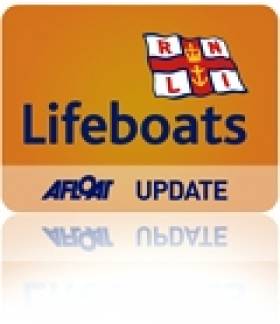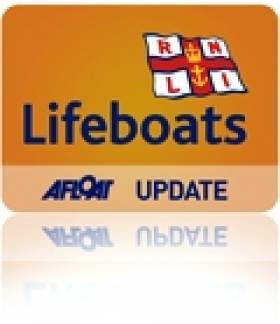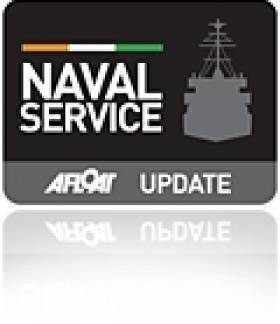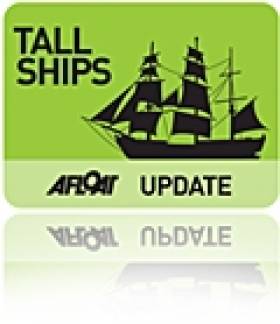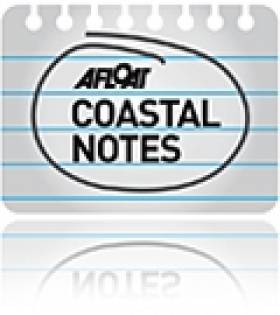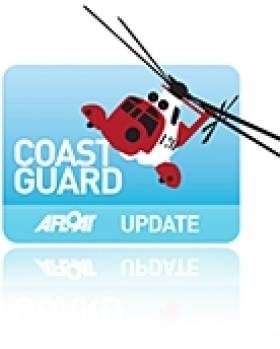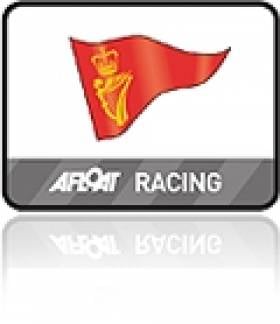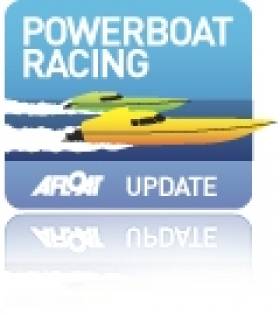Displaying items by tag: youghal
Youghal RNLI Rescue Three From Drifting Cruiser
#RNLI - Youghal RNLI launched yesterday evening (12 August) to a report of a six-meter pleasure craft that was adrift 200m east of Youghal shipping quay in Co Cork.
The lifeboat, helmed by John Griffin Jr with crew members Patsy O’Mahony and Joe Moore on board, launched at at 6.19pm and quickly located the pleasure cruiser, subsequently ascertaining that the boat had suffered engine failure.
There were three people on board; two males and one female. All were wearing lifejackets and were safe and well. The weather at the time was blowing a Force 2-3 north westerly wind with a slight swell.
The volunteer crew established a tow and brought the boat and the three casualties back to its moorings at Ferry Point in Youghal.
RNLI Lifeboat Rescues Stranded Kayaker Off Youghal
#RNLI - Youghal RNLI launched yesterday afternoon (5 August) to a report of an object in the water off Redbarn Strand at Youghal - and picked up a stranded kayaker instead.
The volunteer crew was requested to launch their inshore lifeboat at 2.30pm when a member of the public raised the alarm after spotting something in the water.
The lifeboat, helmed by David Slattery with crew members Martin Morris and Joe Moore on board, located the object minutes after launch. It turned out to be a large human hamster ball that apparently had blown into the water from the strand.
While the crew were taking the ball on board, they spotted a lone male kayaker 50 yards away who had lost his paddle and proceeded to his aid.
The kayaker told the lifeboat crew that he had lost his paddle and was drifting for some time. He was very tired after attempting to paddle with his hands and did not have a spare paddle or any form of communication or flares.
Weather conditions at the time were sunny with a moderate to fresh northerly breeze and a one-metre swell.
The lifeboat took the man and his kayak on board and proceeded back to the Youghal lifeboat station, where they checked if he was in need of any medical attention.
Youghal RNLI lifeboat press officer Noreen Varney said: “It was a very fortunate set of circumstances for the kayaker to be rescued from what originally was a non-related incident.”
#rnil – Youghal RNLI in county Cork launched this evening to search for a young boy who was reported to have got into difficulty at sea while swimming off Youghal beach.
The volunteer crew was requested to launch their inshore lifeboat by the Irish Coast Guard at 5.20pm. A member of the public had raised the alarm after seeing a person in the water who was making no movement.
The lifeboat helmed by Patsy O'Mahony and with crew members Jason Clohessy and Daragh Mathews on board, was on scene, east of Youghal lighthouse, within minutes.
With the tide coming in, two members of the public including a nurse who had swam out to the area where the casualty had disappeared were brought onboard the lifeboat. Several members of the public were assisting in the search along with a numbers of vessels which were in the area at the time.
The lifeboat was alerted by the crew of a fishing vessel that they had located the casualty and brought him on board their boat.
The lifeboat proceeded to the nearby vessel where both crew member Daragh Mathews and the nurse transferred and together began to administer CPR to the casualty. The lifeboat meanwhile escorted the boat to the pontoon at the new jetty in the area.
In what was a multi-agency response, the lifeboat was met at the shore by ambulance paramedics, a doctor, and first responders from the Youghal community. The casualty was airlifted by the Irish Coast Guard helicopter and was subsequently brought to Cork University hospital.
The boy was later pronounced dead.
Speaking following the tragedy, Fergus Hopkins, Youghal RNLI Lifeboat Operations Manager said: 'This is a devastating and heartbreaking loss for this young boy's family and a terrible tragedy for the Youghal community. I wish to offer my condolences and those of Youghal RNLI to the family at this difficulty time
#NavalService- L.É. Ciara (P42) recently made a surprise visit to Youghal, from where the coastal patrol vessel (CPV) was carrying out navigation exercises at the harbour mouth.
On board was Officer Commanding Lt Cdr Brian Sweeney with a crew of 40 approx. Locals and tourists saw the CPV from the vantage points along the quayside.
Among the onlookers were the proud parents of Chief Petty Officer Michael ( Rocky) Cashell from Youghal who was at the wheel of the LÉ Ciara as she steamed up the river Blackwater.
To watch a video of the L.É. Ciara during her brief visit and to read more YoughalOnLine has a report
The small port engages in the export of timber products which are served by coasters.
As previously reported on Afloat.ie, the sale-listed 113 year-old 'Kathleen and May' a historic West Country schooner, made frequent calls to the port town up to the 1960's.
On these calls she would be typically laden with coal having made passage from Bristol.
Historic Coal Ship Could Be Sold To Asia
#TallShips - A tall ship that once plied the route between Bristol and Youghal may be sold to Asia unless funding can be secured to keep it at its current home in Liverpool.
The Daily Mail reports on the 113-year-old schooner Kathleen and May, which has been berthed since 2010 at Liverpool's Hartley Quay where it is cared for by a team of 60 volunteers with support from the UK's Arts Council.
Previously she made heritage visits to Dublin in 2008 and 2009 carrying a cargo of French wine, the first commercial voyages for the vessel since the 1960s.
The ship is the last traditional (West Country) wooden topsail schooner and was built at Deeside. She is also listed on the National Historic Ships Register.
Kathleen and May is priced at £2 million (€2.36 million) and has been on the market since last year.
Now an offer for the former coal ship has come in from a Far East Asian buyer - and concerns are growing that she could leave the British Isles for a new life half-way round the world.
The Daily Mail has more on the story HERE.
Cork Beach Closures Continue as E.coli Results Awaited
#COASTAL NOTES - Cork County Council has announced it will be at least two more days before it knows if its bathing ban at seven beaches can be lifted, according to RTÉ News.
As previously reported on Afloat.ie, the seven coastal beaches - including blue flag strands at Garretstown, Redbarn and Garryvoe - have been closed to swimming over concerns at elevated E.coli levels in the water, resuling from water runoff after the recent heavy rainfall in the county.
Notices were first posted by the council last Friday, and the latest water samples were collected at the affected beaches yesterday.
Youghal is the worst affected by the outbreak, with three beaches closed.
Meanwhile, a popular east coast beach has been reopened after a similar E.coli scare.
The Irish Independent reports that Rush South in north Co Dublin was closed to bathers after bacterial contamination was detected over the August bank holiday weekend.
Levels of E.coli recorded in the water were at 2,143, above the EU mandatory level of 2,000, but samples taken since have been given the all-clear.
A spokesperson for Fingal County Council described it as "a once-off pollution incident that will not have any ongoing impact on bathing at Rush South".
#COASTGUARD - Youghal in Co Cork will host the seventh Joint Search and Rescue (JSAR) competition between the Irish Coast Guard and HM Coastguard Northern Ireland this coming weekend 11-13 May.
The contest is organised by the volunteers of the Youghal Coast Guard unit, and aims to increase the level of awareness of all coast guard members in the island of Ireland, as well as enhance co-operation between services.
Twelve teams from each of Ireland's four coastguard divisions of Dublin, Malin, Valentia and Northern Ireland will take part. A wide range of skills will be tested, from leadership to search planning and co-ordination, chart work, knots, communications and salvage pumping.
The competition also provides a forum for the national maritime SAR management to discuss policy in an informal and friendly environment, and for volunteers from both jurisdictions to exchange their experiences.
Youghal Online has more on the story HERE.
RCYC Hosts 'Moby Dick' Screening
#ROYAL CORK - It was "uncharted waters" for the Royal Cork Yacht Club in Crosshaven last night as it hosted its first ever film screening, a showing of the John Huston classic Moby Dick.
The epic adventure, starring Gregory Peck, was shot on location in nearby Youghal, and tells the story of the obsessed Captain Ahab's pursuit of the titular whale.
Joleen Cronin of the Crosshaven Film Club told the Irish Examiner: "There are lots of people throughout Cork who were involved in the making of the film and it’s a real celebration of movie making and special effects for its time."
The screening is hoped to be the first of many special events at the world's oldest yacht club, which will be hosting the biennial Cork Week regatta from 7-13 July.
Team Youghal Bay Takes Silver on Lough Derg
Youghal Club Plans Open Day
The recently formed Youghal Bay Boat Club (YBBC) has been busy over the past few weeks putting together an exciting itinerary to get more people out on the water. Their open day, the club's first on-the-water event, will kick off with a Parade of Sail at around 2pm, followed immediately by a Parade of Power, all taking place this May Bank Holiday weekend. All boats will then raft up just off the Youghal Quay for some quick speeches and a blessing of the boats.
It's then time for a nautical version of Wacky Races where teams will attempt to navigate a fun course in a combination of sailing dinghies, kayaks and thundercat powerboats. At 3pm the Coastguard helicopter will perform a demonstration with the local RNLI followed by an afternoon of demonstrations and activities from all the different sections within YBBC - dinghies, kayaks, angling, thundercats, wakeboard, windsurf and more.
This is the first 'on-water' outing for YBBC and according to Club Commodore Padraig Brooks it's going to be just a small example of what's to come - "We've been amazed by the amount of support and interest the club has been getting since the idea of a club was mooted at the tail end of last year. We held a number of public meetings over the Winter and out of those we've now formed YBBC with a really strong committee on board to drive things along. Over the Summer months we plan on having a wide variety of exciting events from angling competitions to cruises in company, powerboat races to fun days, all culminating in our first Maritime Festival at the end of August. A lot of different groups had been doing their own thing on the water here in the South East for the last few years and by bringing it all under one club everyone seems to have been re-energised. We extend an open invitation to all to come along, talk to us, and get involved ....whether you have a boat or not".
And getting involved seems to be easier than in many places with club membership being among the lowest in the country (full adult memership is only €55). The club is fully affiliated to the ISA - the national governing body for recreational and competitive activities involving sail and engine powered craft in Ireland. As well as all of the club boats on the water, an open invitation has also been extended to boaters from all along the East and South-East coasts to come and take part - with some very exciting results. Already confirmed are a Sunseeker Manhattan 60 and a Fairline Squadron 58 (two very large and very beautiful motoryachts) and some seriously fast powerboats, including Power Marine's 21 SportCat which is capable of speeds in excess of 160kmph. Members of the club will be on shore to talk to anyone with any questions about how to get involved and music will be provided by Community Radio Youghal who'll be doing a live broadcast from the quay. So if you, like many others, are looking for something to do this upcoming May Bank Holiday Monday, other than the local DIY Store or Garden Centre, Youghal may well be the place to point your car (or boat!) towards.


























